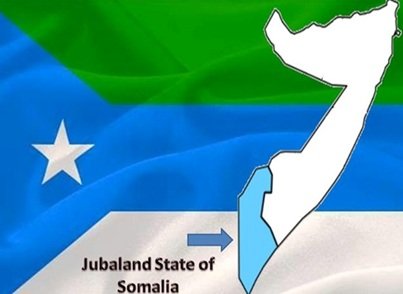By Ahmed Adan Sooldaad
Introduction
Every four years, like a grim ritual, Gedo is plunged into violence. The Federal Government of Somalia (FGS) and Jubbaland authorities lock horns and engage in a bitter struggle—not for the welfare of the people, but for territorial control, resources, and political leverage. Caught in the middle are the Marehan, exploited as pawns, betrayed by their own elites, and left to suffer while power brokers in Mogadishu and Kismayo negotiate their fate.
This is not governance; it is gangster politics masquerading as federalism and clan loyalty, and ordinary civilians pay the ultimate price.
The Proxy War Playbook: Mogadishu vs. Jubaland, Marehan as Cannon Fodder:
The conflict over Gedo is a microcosm of Somalia’s fractured politics. Mogadishu sought to tighten its grip and consolidate power, and under the guise of national unity, the FGS backed loyalist factions, which fuelled instability. In contrast, Jubbaland resists preserving its own autonomy, not out of concern for the Marehan; it arms militias, exploits clan divisions, and allows Gedo to burn so long as its authority in Kismayo remains unchallenged. Foreign actors further intensify the crisis.
Jubbaland’s vulnerability increases the appeal of the Kenyans’ and Ethiopians’ strategic and security interests, making the Jubbaland region more vulnerable to exploitation as they manipulate the conflict for their own aims. Other external players supply funding and weapons, perpetuating chaos. The result? A relentless cycle of violence affects the Marehan and many Somali communities, who suffer the worst. Meanwhile, whenever gunfire erupts in Somalia, civilians bear the burden, losing their infrastructure, enduring casualties and facing displacement of the most vulnerable ones: women and children.
Meanwhile, political and economic elites often withdraw to secure locations and profit from the instability.
The Great Betrayal: The Silence of Gedo’s Elites
The competition between the FGS and Jubbaland is not about governance but territorial dominance and electoral manipulation, often backed by foreign powers under the pretext of one person, one vote (1p1v). The people in the Gedo region are reduced to pawns, their clan identity is weaponised to justify endless conflict, and their intellectuals, politicians, and businesspeople prioritise their interests.
Many remain silent or complicit. They issue tepid calls for “dialogue” while their communities suffer. Some align with Mogadishu or Kismayo, not out of principle, but for personal gain—ministerial positions, business contracts, or a share of the spoils extracted from their own people. This is the ultimate betrayal and abandonment by those who claim to represent them.
The Marehan are not powerless, they produced presidents, generals, scholars, and wealthy entrepreneurs—yet, when Gedo is set ablaze, these elites are conspicuously absent: sitting in Nairobi Malls, in Mogadishu ministries, in Doha hotels, or health visitors in Turkey or the West, counting their profits. Where are the politicians who could negotiate genuine autonomy or equitable power-sharing? Where are the intellectuals who could articulate a vision beyond clan warfare? Where could the business leaders invest in schools rather than in militias? Their absence is as damning as the foreign interference that fuels the conflict.
Breaking the Cycle: A Call to Action
If Gedo is to escape this vicious cycle, the Marehan must reclaim their agency. The FGS, Jubbaland, and foreign powers will never prioritise their wellbeing—only the Marehan themselves can do so, but only if they:
Reject Proxy Politics and refuse manipulation by Mogadishu, Kismayo, or foreign interests. They must resist the militarisation, and their youth must demand political solutions over armed confrontation. Mobilise Intellectual and Grassroots Leadership, including intellectuals, activists, and local leaders, must educate communities on how clan rhetoric serves only warlords and external actors. Grassroots, rather than top-down impositions, should shape Gedo’s future. Redirect Economic Power. The diaspora and business class must invest in local infrastructure—schools, hospitals, and livelihoods—rather than building villas abroad for a non-sustainable development and short-term profiteering, as this is the path to stability.
Conclusion: Gedo’s Fate is in Marehan’s Hands
The situation in Gedo highlights neglect and interference by regional and foreign powers. Mogadishu and Kismayo often ignore Gedo’s complexities, while external involvement frequently worsens tensions. The Marehan community must respond with three key actions.
Firstly, the elite must reject proxy politics. This rejection entails a conscious decision to refrain from aligning with foreign interests that provide arms and funding, often serving ulterior motives rather than the community’s welfare.
Secondly, community intellectuals should prioritise grassroots education and foster dialogue, illustrating how absent discourse predominantly benefits warlords and foreign backers while undermining the community’s unity and progress.
Lastly, the diaspora and local business leaders should prioritise investing towards the region’s infrastructure instead of overseas projects to strengthen the Gedo economy.
Without fundamental internal reflections and a review of these vital factors, Gedo may remain a site of external conflict and ongoing violence. The Marehan community can change this only if its leaders become actively involved.
Ahmed Adan Sooldaad
Email: Sooldaad33@gmail.com


Leave a Reply